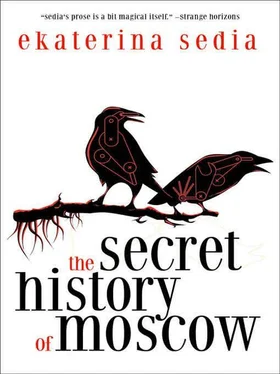David settled at a small table tucked away in the remote end of one of the pub's arms, by a triangular window that allowed in some light from the trees outside, and the view of a row of backyards, overgrown with pale weeds. He brought two glasses and a bottle with him, and poured as soon as Yakov sat down. “Well,” David said, “let me start with my version of the story."
* * * *
David was born in 1900 in Lancashire, outside of Manchester, in a place not so different from the underground town-there was little light, and coal dust hung in the air, giving everything a dusty, black-and-gray look. When it rained, black water slid like sooty tears down the windowpanes of the cotton mill where David's mother worked; he started when he was ten, and by fifteen he was involved with a trade union.
By the time he turned seventeen, the cotton industry had finished its migration overseas, and David left Lancashire to look for a job. He worked as a laborer at the docks and at the hops farms; at night, he read. His connection with the labor unions continued, and by the age of twenty-two he developed an over-inflamed sense of adventure and social justice.
He traveled to Melbourne, Australia-not entirely voluntarily, as he hinted. There, he joined the nascent Communist Party of Australia and started a socialist newspaper, which caught the attention of the authorities somewhat earlier than he believed just, and that of his intended audience-not at all. His link to the illegal Industrial Workers of the World led to criminal charges.
"You have to understand,” he told Yakov and touched his hand with tentative warm familiarity. “In those days, it took a lot to be considered an undesirable person in Australia. A lot . And I only wished that my political activity had done someone some good, for all the trouble it caused me.” He sighed. “Anyway."
The socialist newspaper landed him in jail; by the time he got out, he was a persona non grata in a large segment of English-speaking world.
"So, what brought you to Moscow?” Yakov asked.
"I decided to go to the source, to the place where it actually existed. To learn, so I could understand it better, to explain to people-look, I've seen it, I know. I thought after I had seen socialism, with some first-hand knowledge, I'd be able to persuade them better. And if I were good enough, it was only a matter of time before capitalism in Britain toppled."
"It sounds-naïve,” Yakov said.
David nodded. “That's what everyone here said. Jackdaws have more sense than I. Even the bloody fairytale things laugh at me. So be it. Maybe I am stupid. But if I weren't, I would've never met your grandma. What do you have to say to that?"
Yakov had nothing, and David continued.
Tanya, he said, was the only woman, the only person who interested him more than reading Das Kapital . He first saw her on the bus he took to work every morning, and he threw himself into courtship with his usual single-minded sense of purpose that always got him into trouble. Ironically, for the first time in his adult life he stayed away from politics; but politics wouldn't stay away from him.
Poverty in his new country did not faze him; he was used to poverty, and found that it seemed less tolerable when it was coupled with the wealth of a few. The language barrier, however, presented a challenge. He got a job at a meat-processing facility-it required minimal talking, and the physical exertion helped him think. At night he read as usual, switching for the time to Russian textbooks. And he waited for the mornings, when he would get on the bus and watch the girl with serious eyes and a high ponytail, until she got off a few stops later, by the school. She usually read textbooks on the bus, and he guessed that she was a schoolteacher; one day, he worked up the courage to sit next to her and ask about the pronunciation of a word in the Russian grammar text he carried with him.
"Which word was it?” Yakov interrupted. It seemed suddenly important, to know what was the word that brought them together.
"Saucepan,” David said. “I know, not terribly romantic, but it is a difficult word."
It was spring when they first spoke; by the beginning of summer, they saw each other every day off the bus. By fall, they were married.
Tanya kept her maiden name. David was progressive enough not to mind, but he wondered since it was certainly not traditional. He finally asked her.
She looked at him with her deadly serious dark eyes. “Understand, David. This is not a safe time for foreigners. He (she never mentioned Stalin by name, out of real fear or a superstitious reluctance to attract the attention of malevolent forces by summoning them by name) is insane. Do you know how many people disappear every day? Do you know that you're a suspect just by being a foreigner?"
"But I'm a communist,” he argued.
"You're a fool,” she corrected. “If you want me to, I'll take your last name. Just know that sharing the last name usually means sharing the fate."
"I thought you'd die for me,” he joked.
Her face remained serious, and he wasn't certain that she got it. “No. I would promise to you that I would, if there weren't a real risk of that coming true."
Now he couldn't decide whether she was joking.
He moved to her apartment, shared with a messy middle-aged man, with a propensity to mutter to himself and leave his saucepans soaking in the communal kitchen. Tanya never said anything to him, but David was not so tolerant. “Please clean up after yourself,” he told the neighbor in his best Russian.
The man only scowled and mumbled something. “I do what I want,” he said out loud as he was exiting the kitchen. “You raise stink again, I'll make sure that you're gone."
He told Tanya about the incident, but instead of laughing with him at the crazy neighbor, she cried. She sat on their bed with the nickel headboard, covered by her mother's quilt, and wept. “David,” she said. “You have to understand. You have to be nice to people. You can't afford a single enemy."
"Why me?"
"Because you are a foreigner. He gave power to the worst people, don't you get it? You're too good to rat someone out, and you think that everyone else's the same way. Even the Russians turn each other in, but with you-Maybe we should go to my aunt, to Serpuhov. It's easier to hide in the provinces."
David was not inclined to hide; soon after, he learned that an English-language newspaper needed correspondents, and he applied and got the job by virtue of his ability to read and write English. To his surprise, there weren't many takers for that job, and he admitted that his wife's paranoia seemed commonplace. Worse, the cold feeling in the pit of his stomach told him that she was right.
It was winter when they came for him. He worked at the office until late, and the long blue shadows of the street lamps stretched across the street. He walked home from the bus station-a five-minute walk, but that day it was cold enough to make him hasten his step and rub his ears as he hurried home. The snowdrifts, their delicate blues accented by deeper purple shadows, flanked the street, and the windows in the apartment buildings glowed with yellow warmth.
There were two men waiting by the entrance and he would've paid them no mind if it hadn't been for the scattering of cigarette butts in the defiled dirty snow-they'd been there a while. Then he noticed their black trench coats and a black car with no plates idling by the curb. His heart spasmed in his chest and he forgot about the cold. He only had mind enough to thank the God he didn't believe in for keeping them outside, away from Tanya. He couldn't bring them in, but he wasn't ready to surrender. He kept walking past, his hands shoved deep into his coat pockets. His face grew numb from the stinging cold.
Читать дальше












